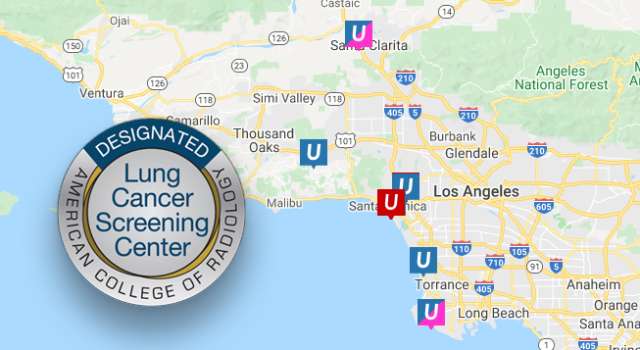Lung Cancer Screening
Why choose UCLA Health for lung cancer screening?
At UCLA Health, our specialists work together to give you an expert evaluation you can trust. When you choose UCLA Health for lung cancer screening, you’ll find:
Advanced technology: UCLA Health lung specialists use low-dose computed tomography (LDCT) scanning, the gold standard for early detection of lung cancer. LDCT creates detailed images of the lungs with significantly less radiation than a chest X-ray. Through clinical trials, UCLA Health helped establish LDCT scanning as the best way to screen for lung cancer.
Precise diagnosis: An early diagnosis of lung cancer allows us to destroy cancer when it’s most treatable. If your screening suggests lung cancer, we use advanced testing and procedures to learn about the specific type of cancer and understand its genetic makeup. This approach, called precision medicine, allows us to offer more effective treatments. Learn more about precision medicine at UCLA Health.
Screening close to home: We offer LDCT studies at many of the UCLA Health imaging and interventional centers across Southern California. Our goal is to improve access to lifesaving lung cancer screenings and make care more convenient for you.

Our specialties
UCLA Health lung cancer screening experts specialize in detecting, evaluating and diagnosing lung cancer. You can trust your care team to provide world-class screening services and follow-up care. We offer:
Advanced lung cancer screening
We focus on finding lung cancer at its earliest stages. Our pulmonary and thoracic physicians use the latest imaging techniques to detect lung abnormalities in patients who are at risk for developing lung cancer. This thorough screening for lung cancer process enables us to deliver a diagnosis as early as possible so treatments will be more effective.
Comprehensive evaluations
We bring together pulmonologists (lung physicians), radiologists (imaging specialists) and thoracic surgeons, who focus only on the chest and lungs. Our experienced multispecialty team offers:
- Effective communication with patients and referring physicians
- Expert interpretation of CT scans by radiologists who work only with chest and lung imaging
- Full evaluations by physicians and surgeons who specialize in lung cancer
- Regular monitoring of identified lung nodules to detect any changes
- Surveillance (watchful waiting) of high-risk patients to spot lung cancer early
- Streamlined access for patients to receive lung cancer care at UCLA Health
Who should get a lung cancer screening?
If you’ve ever been a smoker or you have other lung cancer risk factors, regular screening is the best way to detect disease. Lung cancer symptoms often don’t appear until the cancer is advanced. A screening for lung cancer can detect long before you realize it’s there, and finding lung cancer early allows your care team to deliver timely lifesaving treatments.
Talk to your doctor about when you should be screened for lung cancer. Generally, you should get screened yearly if you’re between 50 to 80 years old and you:
- Currently smoke, or you quit smoking in the past 15 years
- Have a 20 pack-year smoking history (which means you smoked at least a pack of cigarettes a day for 15 - 20 years)
- Have other risk factors, such as breathing problems or other cancers, exposure to radon or asbestos, or a family history of lung cancer
How low-dose CT screening works
Low-dose CT (LDCT) screening combines an X-ray machine and sophisticated computers to create detailed images of your chest. LDCT is very sensitive and precise. This technology detects even the smallest nodule on the lungs while using 90% less radiation than a traditional chest imaging scan. During a LDCT scan, you’ll lie on your back on an exam table. You may be asked to raise your hands over your head. The table will slowly move through the machine while you hold your breath for each short scan (10 seconds or less). Screening is painless and usually takes just a few minutes.
Meet our team
Our team of radiologists and pulmonologists has specialized training and extensive experience evaluating images of the lungs and chest. We work closely with thoracic surgeons to deliver accurate lung cancer screenings and outstanding care.
Contact us
Our experts evaluate your risk for lung cancer and deliver lifesaving lung cancer screenings. Call 888–264–LUNG to connect with a specialist.